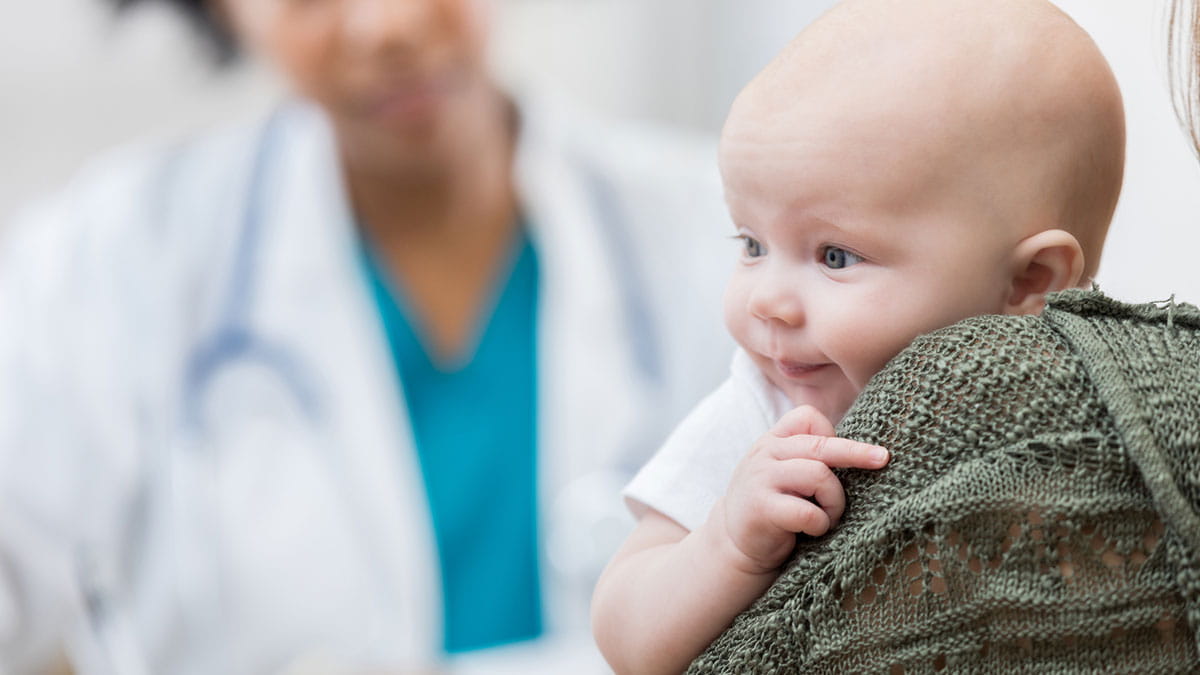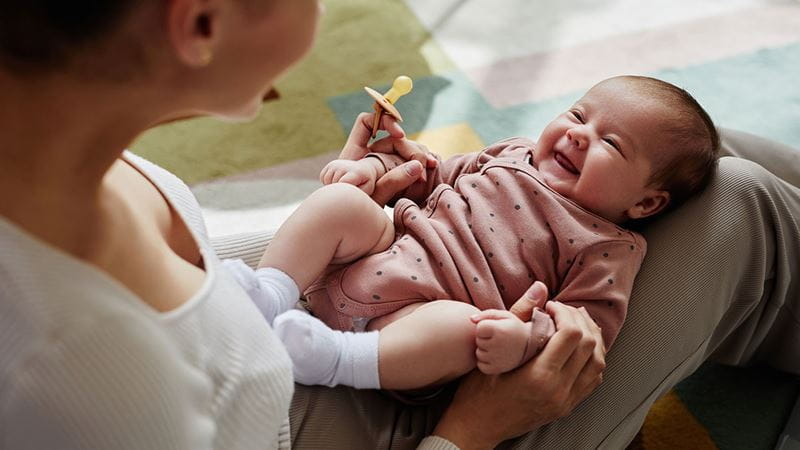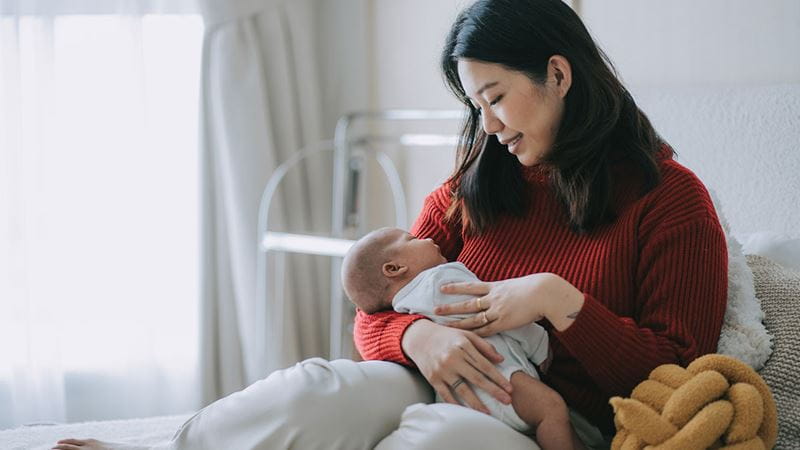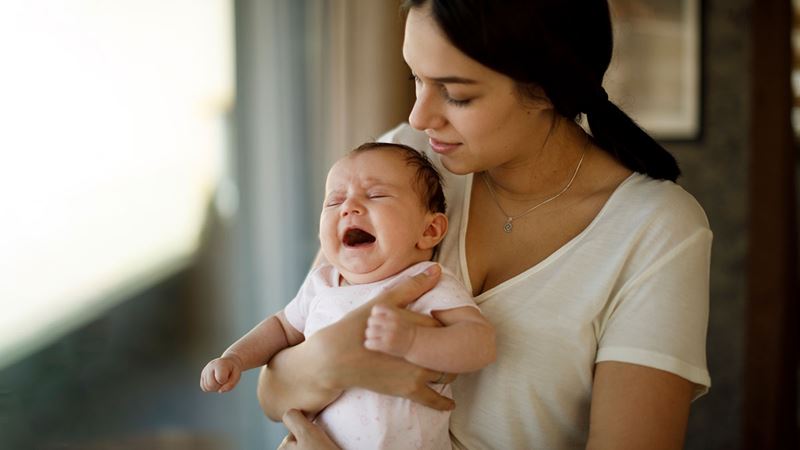Blog article
What to expect at your baby’s first 6-week doctor visit

The first six weeks with your baby can feel like a whirlwind of feeding, cuddling, and wondering if you’ll ever sleep again. And just when you start to find your rhythm, it’s time for your baby’s first big health check.
This visit is a key milestone, not just for your baby’s development, but for your peace of mind. In this blog we cover what to expect, what to bring, and how to prepare for your baby’s first round of vaccinations.
What is the 6-week check?
The 6-week check is a routine health assessment that gives your GP or paediatrician a chance to see how your baby is growing and developing. It’s also a moment to check in on how you’re doing – because your wellbeing matters too!
During the visit, your doctor will:1,2
- Measure your baby’s weight, length, and head circumference and plot these on a growth chart.
- Check your baby’s eyes, hips, heart, skin, and reflexes.
- Observe how your baby responds to touch, sound, and movement.
- Ask about feeding, sleep, bonding, and any concerns you might have.
If your baby was born prematurely or had complications, you might also have a follow-up appointment with a specialist clinic.
What vaccinations are given and what they protect against
Between 6-8 weeks, your baby will receive their first round of immunisations under the National Immunisation Program. These vaccines protect against serious illnesses and help build your baby’s immune system.
Vaccines typically given at this visit include:3
- DTPa: Protects against diphtheria, tetanus, and pertussis (whooping cough).
- Polio: Protects against poliovirus.
- Hib: Protects against Haemophilus influenzae type b.
- Hepatitis B: Protects against liver infection.
- Pneumococcal: Protects against pneumonia and meningitis.
- Rotavirus: Protects against severe diarrhoea and vomiting.
The vaccines will be recorded in your myGov account via the Australian Immunisation Register.4
Will my baby receive the influenza vaccine?
No. Only infants 6 months and older are recommended to receive the seasonal influenza vaccination.12
Can I catch rotavirus from my baby after they have the vaccine?
While it is possible to catch rotavirus from your baby after they receive the rotavirus vaccine, the risk is very low. After receiving the oral rotavirus vaccine, babies may shed a weakened version of the virus in their poo for up to two weeks. This is a normal part of how the vaccine works and isn’t usually a cause for concern.5,6
To reduce the chance of transmission, especially to immunocompromised or pregnant household members, remember to:5
- Wash your hands thoroughly after every nappy change.
- Avoid touching your face before washing.
- Clean and disinfect surfaces regularly, especially in shared spaces.
While transmission of the vaccine virus has been documented in close contacts, it’s extremely rare for this to lead to illness. In fact, vaccinating babies helps protect the whole household.6
Aftercare for baby vaccinations
Watching your baby cry after a needle can feel like a punch to the heart. You might even feel a twinge of guilt (you’re not alone!) – but take comfort that you’re doing one of the safest, most powerful things to protect your child’s health.
And while the moment might be tough, the side effects are usually mild and short-lived. It’s common for babies to experience:,7,8
- Sleepiness or extra naps
- Mild fever
- Redness or tenderness at the injection site
- Fussiness or crying
- Occasionally, a small lump (nodule) at the injection site that may last a few weeks
How to comfort my baby after their vaccinations?7,8
- Offer extra cuddles, comfort, and calm.
- Apply a cool cloth to the injection site.
- Keep your baby hydrated and avoid overdressing if they’re warm.
- Try skin-to-skin contact, gentle rocking, or breastfeeding.
What if my baby has pain or develops a fever after vaccination?
Routine use of paracetamol is not recommended before or after vaccination however, infant paracetamol may be recommended by your GP or nurse if your baby develops pain at the injection site or a fever (temperature over 38°C) following vaccinations. If your baby seems unusually drowsy, their pain or fever persists or you’re worried, don’t hesitate to call your GP or maternal child health nurse.
Vaccines and autism
Despite persistent myths, vaccines do not cause autism. Multiple large-scale studies have found no link between childhood vaccinations and autism spectrum disorder.9,10 The idea originated from a now-discredited study published in 1998, which has since been retracted, and whose author has since lost his medical licence. Trusted organisations like the World Health Organization, CDC, and Australian Government all confirm that vaccines are safe and essential for public health.11
Immunisation is one of the most important achievements of modern medicine and currently prevents 3.5 million to 5 million deaths every year.10
What to bring to your baby’s first 6-week doctor visit
- Baby’s Medicare card (if you have it).
- Health record book (this will vary state to state).
- A list of any questions you may have.
- A comfort item for your baby.
Need support before your baby’s first 6-week doctor visit?
Extra support is always available. You can call Pregnancy, Birth and Baby, a national Australian Government service, on 1800 882 436 or use their video call service to speak directly with a maternal child health nurse. This free service is available 7 days a week, from 7am to midnight (AET). You can also call the Healthdirect helpline on 1800 022 222, available 24/7.
Sources:
1 Australian Family Physician - The 6 week check An opportunity for continuity of care
2 The Women’s - Baby’s Follow-Up Appointment
3 Australian Government Department of Health, Disability and Ageing - Immunisation for children
4 Services Australia - Australian Immunisation Register
5 NHS - Rotavirus vaccine
6 Australian Immunisation Handbook - Rotavirus
7 Better Health Channel - Immunisation – side effects
8 Pregnancy, birth and baby - Immunisation and vaccinations for your child
9 Nemours Children’s Health - Is There a Connection Between Vaccines and Autism?
10 Dialogues in Clinical Neuroscience - Vaccination as a cause of autism—myths and controversies
11 World Health Organization - Vaccines and immunization
12 Australian Immunisation Handbook - Influenza (flu)
This article contains general information only and does not take into account the health, personal situation or needs of any person. In conjunction with your GP or treating health care professional, please consider whether the information is suitable for you and your personal circumstances.


